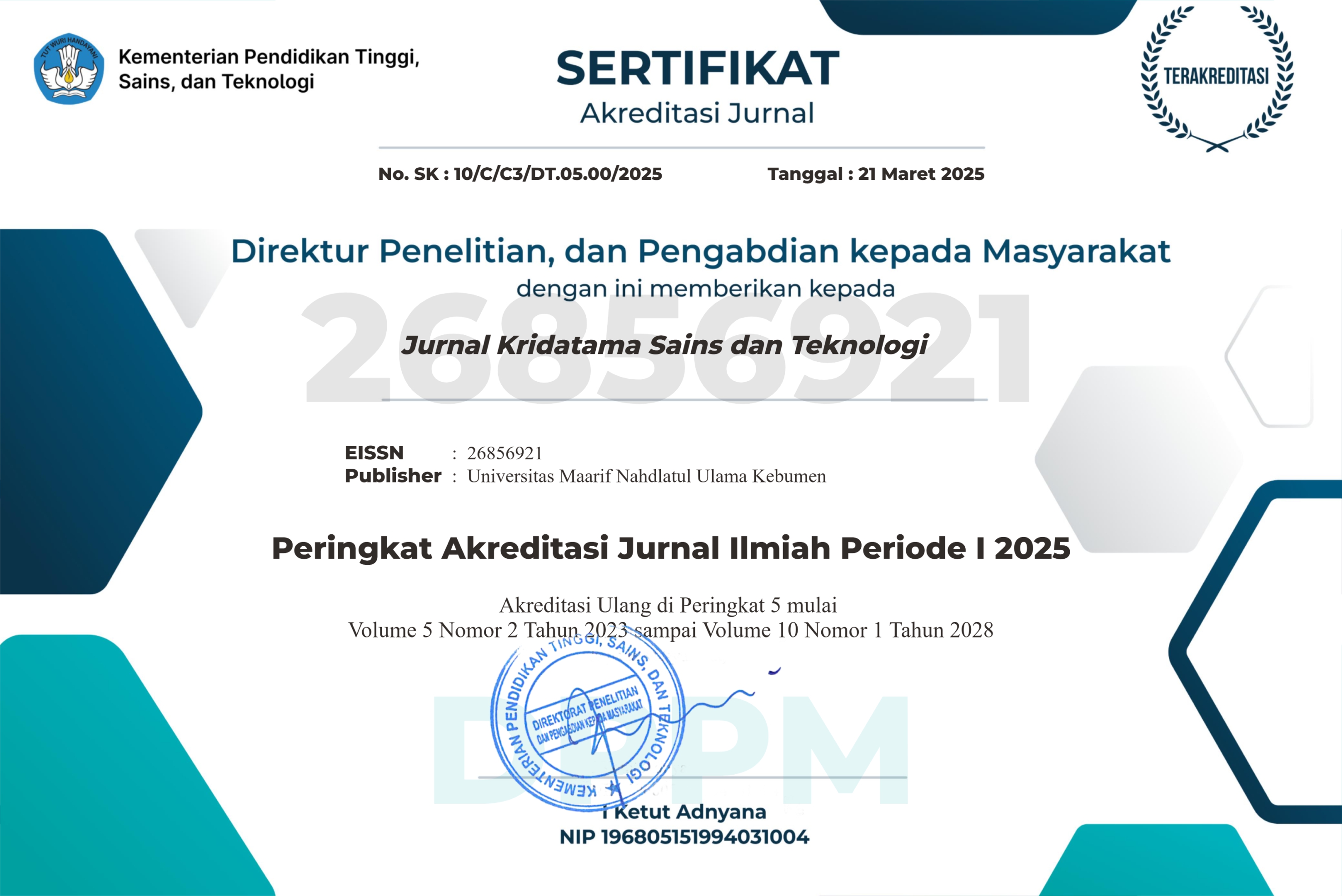Manajemen Pondok Pesantren dalam Pembentukan Sikap Kemandirian Santri di Pondok Pesantren Ell-Futhah Bulupayung
DOI:
https://doi.org/10.53863/kst.v4i02.603Abstract
This study aims to describe and analyze in depth the management of the boarding school in the formation of attitudes of self-reliance of students in the Boarding school Ell-Futhah Bulupayung, start from planning, organizing, implementation, monitoring and evaluation of the program. This study is a field research with qualitative approach. Data collection techniques using observation, documentation and interviews. The data analysis uses interactive model consisting of data collection, data reduction, data presentation, and conclusion. Examination of the validity of data persistence observation, and triangulation methods. The results showed that the management of education in the program of formation of the attitude of self-reliance of students in the Boarding school Ell-Futhah Bulupayung conducted with four stages, namely (1) Planning already existed before independence programs were implemented such as the procurement of meeting, selection of program self-reliance, and other. The planning stage includes: planning the curriculum, teaching materials, personnel, facilities and infrastructure, as well as program planning; (2) The Organization implemented with the involvement of the elements of boarding schools such as the chaplain, coach, instructor and all elements to help organizing the program of the independence of the students has been running well although there are still lack of human resources because the division of tasks is still stacked and the number of students who follow the activities of the skills in the boarding school; (3) The Implementation of the program was implemented with several stages in which carry out teaching and learning activities, organizational activities of the compulsory routine of the boarding school, individual activities of students day-to-day, activity support, and rules of discipline of the lodge; (4) Supervision and evaluation of the program, caretakers and administrators along with the community participated in evaluating such activities. If there is a weakness, then it will be given input for improvement in the future.
Keywords: Planning, Organizing, Implementation, Monitoring and Evaluation of the Program, the Independence of Students
References
Ali, Mohammad & Muhammad Asrori. (2006). Psikologi Remaja Perkembangan Peserta Didik. Jakarta: Bumi Aksara.
Arifin, Zaenal. (2012). Pengembangan Manajemen Mutu Kurikulum Pendidikan Islam. Yogyakarta: Diva Press.
Chapman. (2002). Management and Efficiency in Education: Goals and Strategies. Manila-Hongkong: Asian Development Bank and Comparative Education Research Center, The University of Hongkong.
Desmita. (2012). Psikologi Perkembangan Peserta Didik: Panduan bagi Orangtua dan Guru dalam Memahami Psikologi Anak Usia SD, SMP, dan SMA. Bandung: Remaja Rosdakarya.
Dhofier, Zamakhsyari. (2011). Tradisi Pesantren (Studi Pandangan Hidup Kyai dan Visinya Mengenai Masa depan Indonesia). Jakarta: LP3ES.
Gea, Antonius Atosakhi dkk. (2003). Character Building 1 Relasi dengan Diri Sendiri (Edisi Revisi). Jakarta: Elex Media Komputindo.
Handoko, T. Hani. (2001). Manajemen Personalia dan Sumber Daya Manusia. Yogyakarta: BPFE.
Hartono, Djoko. (2012). Pengembangan Manajemen Pondok Pesantren di Era Globalisasi: Menyiapkan Pondok Pesantren Go Internasional. Surabaya: Ponpes Jagad ‘Alimussirry.
Hasibuan, Malayu SP. (2005). Manajemen: Dasar, Pengertian, dan Masalah. Jakarta: Bumi Aksara.
Ismail SM., dkk. (ed). (2002). Dinamika Pesantren dan Madrasah. Yogyakarta: Pustaka Pelajar.
Kanzie R.A. Mac. (1969). The Management Process in 3-D. Harvard Bussines Review.
Manulang, M. (2008). Dasar-Dasar Manajemen. Yogyakarta: Gadjah Mada University Press.
Mas’ud, Abdurrachman dkk. (2002). Dinamika Pesantren dan Madrasah. Yogyakarta: Pustaka Pelajar.
Qomar, Mujamil. (2007). Manajemen Pendidikan Islam Strategi Baru Pengelolaan Lembaga Pendidikan Islam. Surabaya: Erlangga.
Sasono, Adi. (1998). Solusi Islam Atas Problematika Umat. Jakarta: Gema Insani.
Stoner, James A. F. & Freeman, Edward R. (1992). Management. New Jersey: Prestice Hall.
Suryosubroto. (2004). Manajemen Pendidikan Sekolah. Jakarta: Rineka Cipta.
Syamsudduha. (2004). Manajemen Pesantren: Teori dan Praktek. Yogyakarta: Graha Guru.
Syukur, Fatah. (2012). Manajemen Sumber Daya Manusia. Semarang: Pustaka Rizki Putra.
Tafsir, Ahmad. (2005). Ilmu Pendidikan Dalam Perspektif Islam. Bandung: Remaja Rosdakarya.
Tayibnapis, Farida Yusuf. (2008). Evaluasi Program & Instrumen Evaluasi Untuk Program Pendidikan & Penelitian. Jakarta: Rineka Cipta.
Terry, George R. (2006). Prinsip-prinsip Manajememen. Terj. J. Smith. Jakarta: Bumi Aksara.
Tim Dosen Administrasi Pendidikan UPI. (2009). Manjemen Pendidikan. Bandung: Alfabeta.
Ustman, AH Kahar & Nadhirin. (2008). Buku Daros: Perencanaan Pendidikan. Kudus: Stain Kudus.
Wahid, Abdurrahman. (1999). Bunga Rampai Pesantren. Jakarta: Dharma Bhakti.
Wahid, Abdurrahman. (2001). Menggerakkan Tradisi-Tradisi Esai-Esai Pesantren. Yogyakarta: LKiS.
Downloads
Published
How to Cite
Issue
Section
License
Copyright (c) 2022 Teti Ratnawulan,Ayi Najmul Hidayat,Mugiarto Mugiarto,Agus Salim Chamidi

This work is licensed under a Creative Commons Attribution-NonCommercial-NoDerivatives 4.0 International License.
Authors retain copyright and grant the journal right of first publication with the work simultaneously licensed under a Creative Commons Attribution-ShareAlike 4.0 International License that allows others to share the work with an acknowledgment of the work’s authorship and initial publication in this journal

















